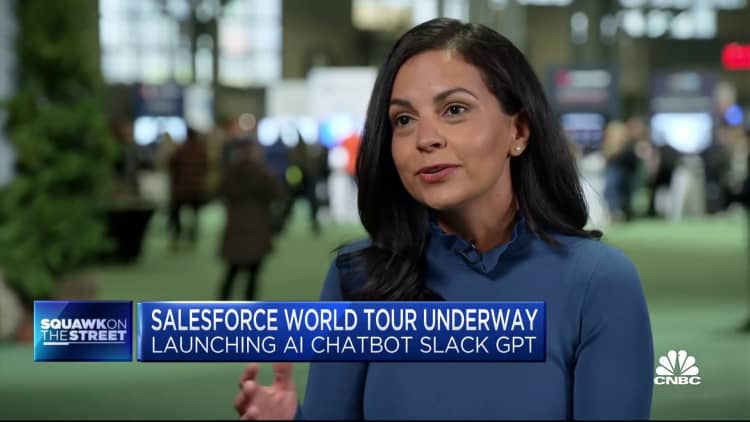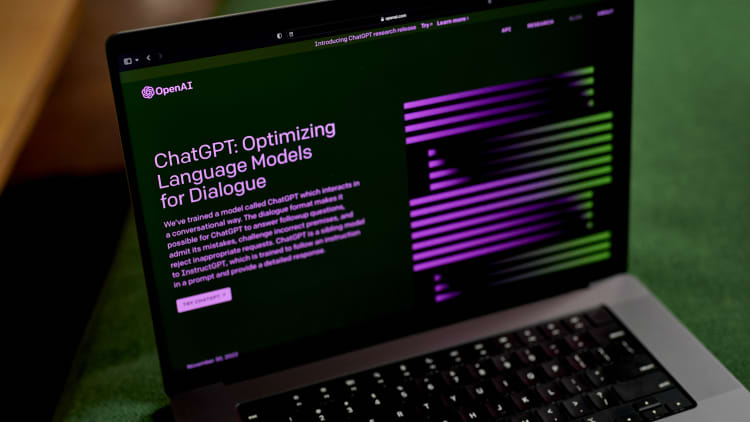There's been a lot of buzz around the role that artificial intelligence technology might play at work, but the workforce still has a lot of catching up to do.
That's according to a new report from Salesforce, which surveyed 11,000 workers across 11 markets in February to find out "how the workforce perceives the role that generative AI will play" in jobs.
The emergence of chatbot ChatGPT sparked an AI arms race in recent months: Big Tech firms — including Google, Microsoft and Salesforce — have since looked to infuse AI across their business.
Salesforce recently launched Einstein GPT — which uses generative AI technology and OpenAI's advanced AI models — to help with tasks like creating personalized emails for salespeople and responses for customer service representatives.

But even though companies are making hefty investments into AI, most workers have yet to use it — "only 1 in 10" globally say their day-to-day role currently involves AI skills, the survey found.
Such skills include AI-specific programming languages, machine learning and automation testing.
That's despite the "excitement" workers feel about the prospect of using generative AI at work, said Salesforce.
"In fact, more workers were excited about its use in their workplace (58%) than worried about it replacing them in their job (42%)," the cloud software company added.
Generative AI's ability to create text, images and other content in response to human input has surfaced new fears of jobs being replaced by tech.
With its ability to supercharge human capabilities, AI should be used as a tool to empower the workforce rather than hindering or replacing them.Sujith AbrahamSalesforce
A recent Goldman Sachs report found that as many as 300 million jobs around the world could be affected by AI and automation, such as office and administrative support roles.
"With its ability to supercharge human capabilities, AI should be used as a tool to empower the workforce rather than hindering or replacing them," said Sujith Abraham, Salesforce ASEAN's senior vice president and general manager.
"[But] it is not without risk. This aspect is embedded in our generative AI guidelines that help guide responsible development and implementation of this transformative technology, that includes human participation."
Skills leaders want
People leaders said "data security skills, ethical AI and automation skills, and programming skills" will become increasingly important in the workplace, according to Salesforce.
Yet, there's a "disconnect" between the skills companies need for the future, and those currently used by the workforce.
That gap will continue to exist as businesses race to develop AI technologies, Salesforce added.

While 4 in 5 global workers report using digital skills in their day-to-day work, few report having skills beyond "collaboration technology, digital administration, and digital project management," the company said.
Only 14% say their role involves other related digital skills such as encryption and cybersecurity, and 13% claim to use coding and app development skills.
The penetration of AI skills also differs across industries. It comes as no surprise that the tech industry is the one that uses the most AI skills globally, Salesforce added.
"But even for this industry, less than a third of employees use AI skills within their role today," Salesforce added.
Things are a bit different in Asia, however. For example, in India, it's the travel and tourism industry, rather than tech, that ranks highest for the application of AI skills — with 67% using AI skills in their roles today, Salesforce told CNBC Make It.
"Over the past year, AI usage has become more prevalent within the industry, with AI-powered systems and chatbots empowering consumers with more comprehensive and real-time insights," said Abraham.

"Businesses can drive rules in their systems to generate more personalized options and bring consumers closer to a decision."
As for Singapore, the industry that ranked highest for the application of AI skills was manufacturing — even though only 21% say they use AI skills within their role.
"The manufacturing industry is a critical part of Singapore's economy, representing approximately 21% of the country's GDP in 2022," said Abraham.
"AI has been crucial to drive improvements in efficiency, quality of production and service processes."
That includes using real-time or predictive models to better manage logistics and supply chain challenges, he added.
Shift to skills-based hiring
In light of the shift toward skills-based hiring, picking up more skills will be "critical" for an AI-powered future, said Salesforce.
Its survey found that 82% of people leaders said skills are the "most important attribute" when evaluating candidates.
That's a lot higher than the 18% who said relevant degrees are the most important.
"With the rapid pace of innovation today, skills-based hiring ensures that businesses can swiftly leverage new technologies," Abraham said.
"Companies are recognizing the value of a skilled workforce in remaining competitive and adaptable."

And 97% of global workers say they believe that businesses should prioritize AI in their employee development strategy, according to the survey.
Companies should therefore actively enable employees to pick up skills, said Abraham.
"Workers need to be enabled with the hard and soft skills to use AI solutions that are already embedded into everyday systems and work applications," he added.
"This includes understanding the parameters in which to work with AI, the types of use cases where AI can deliver the best results, validating the responses generated from AI, [and] spotting red flags in the generated content."
Don't miss: Here are the top skills you will need for an ‘A.I.-powered future,’ according to new Microsoft data
Like this story? Subscribe to CNBC Make It on YouTube!

